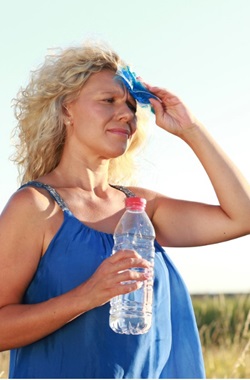 As people get older, their natural defenses begin to break down, leaving people age 65 and older more likely to develop health problems related to heat exposure. Seniors also are more likely to have a chronic medical condition that changes normal body responses to heat and are more likely to take prescription medications that affect the body’s ability to control its temperature or sweat.
As people get older, their natural defenses begin to break down, leaving people age 65 and older more likely to develop health problems related to heat exposure. Seniors also are more likely to have a chronic medical condition that changes normal body responses to heat and are more likely to take prescription medications that affect the body’s ability to control its temperature or sweat.
“Our bodies lose some natural ability to regulate temperature as we age—making it more difficult for people to respond to hot weather in the same ways that younger people may,” said Michael Fitch, M.D., professor of emergency medicine at Wake Forest Baptist Medical Center. “A person with dementia or another chronic medical condition may not even be aware of being thirsty or feeling overheated,” said Fitch.
Heat-related illnesses can include heat exhaustion and heat stroke. According to the Centers for Disease Control and Prevention (CDC), symptoms of heat exhaustion can include: heavy sweating, cold, pale and clammy skin, fast, weak pulse, muscle cramps, feeling tired or weak or vomiting. If not treated, heat exhaustion may lead to heat stroke.
Warning signs of a heat stroke can include: high body temperature (103°F or higher), hot, red, dry, or damp skin, a fast and strong pulse, confusion. Headaches, dizziness and nausea are also indicators of heat-related illnesses. Heat strokes can be fatal if not recognized and treated in time.
Fitch and the CDC recommend the below tips to help prevent heat-related illnesses in the elderly:
- Stay in air-conditioned buildings as much as possible—don’t rely on fans as the only cooling source during times of extreme heat.
- Stay well hydrated by drinking water or sports drinks. Avoid drinks with caffeine and alcohol and don’t wait until feeling thirsty before beginning hydration.
- Limit using the stove or oven to cook during times of extreme heat.
- Wear loose, lightweight and light-colored clothing.
- Take cool showers or baths to cool down.
- Limit strenuous outdoor activities and get plenty of rest.
“If you have an older relative or neighbor, it’s important to keep in frequent touch with them during times of hot weather,” said Fitch. “Keeping in mind that someone may not even be aware of feeling hot or thirsty, it is very important for others to check on the health and well-being of loved ones and friends.”
